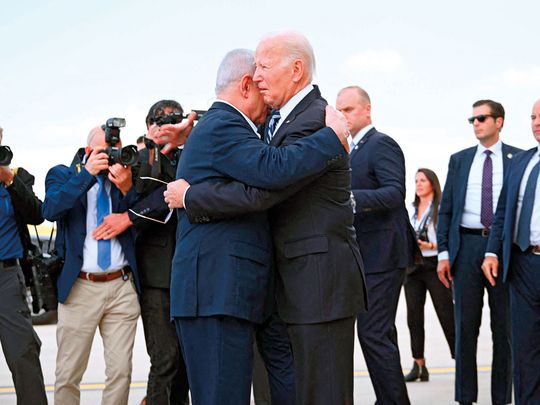
For decades now the world, especially leaders in the Arab region, believed that the US has considerable and exclusive leverage over Israel. Such belief was cemented in the 1960s but became evidently clear following the 1973 Arab-Israeli war when the US established an air bridge to help a shocked Israel recover from a surprise two-fronted Arab attack that almost brought the Jewish state to its knees. From thereon, the strategic bond between the two nations appeared ironclad.
But every time the US attempted to mediate between Israel and the Palestinians — describing itself as an honest broker — it was either blindsided or stonewalled by extreme Israeli politicians. The Arafat-Rabin-Clinton phase was the exception.
It brought about the Oslo Accords and the possibility of an end to decades of conflict and illegal occupation; leading to the establishment of a Palestinian state — later the two-state solution. Unfortunately, a Jewish extremist assassinated Yitzhak Rabin, paving the way for the rise of one influential opponent of the two-state solution; Benjamin Netanyahu.
Since 1993 and until today, the US made sure that it had full control of a stalled peace process — it had been bogged down since 2009 — while looking the other way as Israel, under no other than Netanyahu himself, bulldozed its way to undermine Oslo and the Palestinians Authority (PA) while propping up to none other than to Israel’s nemesis — Hamas.
Netanyahu snubbed President Barack Obama’s attempt to deliver on his promise to make a Palestinian state a reality. In a humiliating move, Netanyahu turned his back to Obama’s White House and flew to Washington to address a joint session of Congress, in 2015, on the looming threat of a nuclear Iran, while totally brushing aside any mention of peace with the Palestinians.
That set a dangerous precedent and Netanyahu appeared as the Israeli politician who can shrewdly manipulate Capitol Hill and the White House while relying on the pro-Israeli lobbies in Washington DC to recruit US lawmakers.
A consummate player
And that is precisely what Netanyahu is doing today as he deflects pressure from the Biden administration to set a time limit to Israel’s Gaza campaign or to limit civilian deaths and allow humanitarian aid in. Netanyahu lived part of his youth in the United States where he was educated. He later served as an officer at the Israeli embassy in Washington and as Israel’s ambassador to the UN. He understands the nuances of US politics better than any other Israeli politician.
Today, at 74, Netanyahu is playing the Biden administration as he seeks to win a bloody war in Gaza and save his political career. While a number of prominent Israeli politicians, including former premiers Ehud Barak and Ehud Olmert have denounced him as a national disaster, for empowering the Israeli Far Right and calling for his immediate dismissal, the West is dealing with him even as he ignores calls for a ceasefire in Gaza.
The false premise is that the US has leverage over the Israeli government. Despite strong appeals from America’s closest allies, the Biden administration is unable to put pressure on Netanyahu and his warmonger allies.
Even when President Joe Biden, after more than two months of relentless bombing of Gaza, warned that Israel is losing support around the world because of its “indiscriminate bombings” of Palestinians. Still, he would not set a deadline for Israel’s war nor would he hint at any lack of military support of Israel at any time.
Netanyahu understands that this is an election year and that the US is deeply polarised over many issues. Any attempt to put pressure on Israel would be attacked by the right wing of the Democratic Party and, most importantly, by Republican candidates who have sparred on almost every issue except their blind support of Israel.
And while Biden is losing the votes of young left leaning voters over Gaza, which may cost him the election come November, the reality is that the US presidency has lost much of its leverage over Israel over the decades.
There is no more Jimmy Carter, Ronald Reagan, George Bush Sr., or even Bill Clinton. What’s more, there is no more Dwight D. Eisenhower, who in 1956 issued an ultimatum to Israel, the UK, and France to pull out from the Sinai and the Suez Canal after the 1956 Suez Crisis.
US sway over Israeli policy?
Those who still believe the US has leverage over Israel should look again. Over 70-plus days of the most aggressive attack on Gaza has failed to bring the US to vote for a ceasefire resolution even when more than 150 countries supported it. All the US can say now is asking Israel to limit civilian casualties while setting no timeline for ending the carnage.
Believing the US can force Israel to accept a two-state solution, allow the PA to take over Gaza, or end the settlers’ aggressions in the West Bank is a mirage. The region should expect the worst-case scenario to happen.
America’s ability to change the course of Israeli politics is a myth. The US presidency is engulfed in bi-partisan squabbles over immigration, abortion, family values, and gender affiliations, among others. To expect the US president to force Israel into accepting a settlement with the Palestinians is another myth. Only a strong and united regional stand can change a dangerous trajectory.
Osama Al Sharif is a journalist and political commentator based in Amman.










